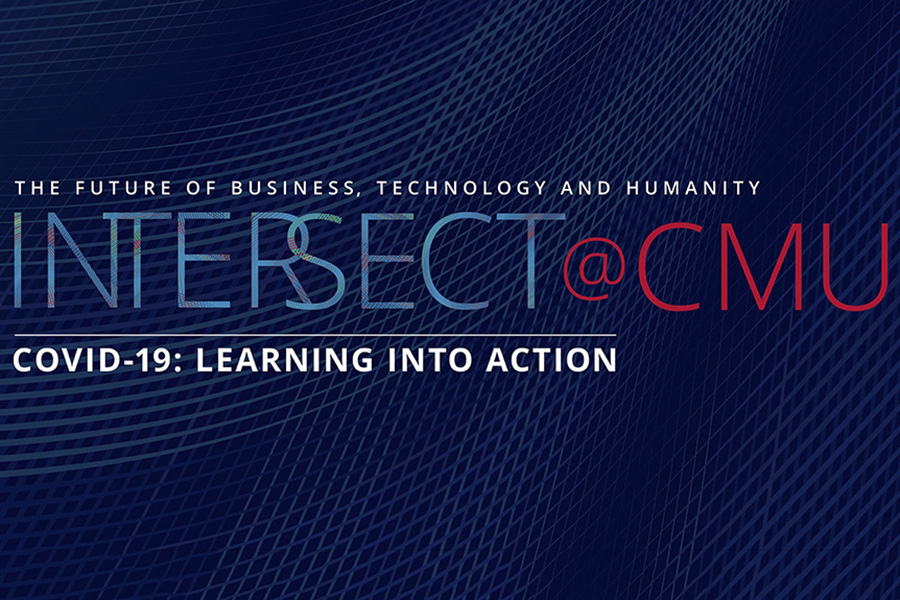
INTERSECT is a university-wide effort supported by all seven colleges at CMU. Sessions begin on Sept. 10 and will be held from Sept. 10-13, 18, 25 and Oct. 2. The conference is free and open to all, and all participants must register.
 "INTERSECT has grown every year, through the hard work, support and participation of people across CMU," said Alan Scheller-Wolf, the Richard M. Cyert Professor of Operations Management in the Tepper School of Business and one of three co-chairs for INTERSECT'S program committee. "We embrace the idea of working across schools, disciplines and boundaries to collaborate to try and solve society's largest problems. INTERSECT is a very tangible embodiment of this."
"INTERSECT has grown every year, through the hard work, support and participation of people across CMU," said Alan Scheller-Wolf, the Richard M. Cyert Professor of Operations Management in the Tepper School of Business and one of three co-chairs for INTERSECT'S program committee. "We embrace the idea of working across schools, disciplines and boundaries to collaborate to try and solve society's largest problems. INTERSECT is a very tangible embodiment of this."
 Each week of the conference will address a different subtheme, beginning with Health. The event will kick off with a "A Conversation on the Data Revolution and the Future of Health Care" between speakers Glen de Vries, a CMU alumnus, co-CEO of Medidata and author of "The Patient Equation: The Precision Machine Revolution in the Age of COVID-19 and Beyond"; and Rebecca Doerge, the Glen de Vries Dean of the Mellon College of Science.
Each week of the conference will address a different subtheme, beginning with Health. The event will kick off with a "A Conversation on the Data Revolution and the Future of Health Care" between speakers Glen de Vries, a CMU alumnus, co-CEO of Medidata and author of "The Patient Equation: The Precision Machine Revolution in the Age of COVID-19 and Beyond"; and Rebecca Doerge, the Glen de Vries Dean of the Mellon College of Science.  On Sept. 11, Evelynn M. Hammonds, chair of the Department of the History of Science, Barbara Gutmann Rosenkrantz Professor of the History of Science and Professor of African and African American Studies at Harvard University, will give the Health keynote, followed by a panel discussion addressing how the American health care system is responding to the pandemic, and how it can be made more robust and equitable moving forward.
On Sept. 11, Evelynn M. Hammonds, chair of the Department of the History of Science, Barbara Gutmann Rosenkrantz Professor of the History of Science and Professor of African and African American Studies at Harvard University, will give the Health keynote, followed by a panel discussion addressing how the American health care system is responding to the pandemic, and how it can be made more robust and equitable moving forward.  On Sept. 18, Marcia McNutt, president of the National Academy of Sciences, will deliver the Sustainability keynote, followed by a panel discussion on how COVID-19 presents opportunities to rethink sustainability.
On Sept. 18, Marcia McNutt, president of the National Academy of Sciences, will deliver the Sustainability keynote, followed by a panel discussion on how COVID-19 presents opportunities to rethink sustainability. Additional keynotes for the Economy and Education sessions of INTERSECT will be announced soon. Check the full conference schedule for future updates.
"If we want to help mitigate the negative effects of the COVID-19 pandemic, we first need to understand these effects from a medical standpoint, a social standpoint, an economic standpoint and an equity standpoint," Scheller-Wolf said. "We need collaboration between experts, as well as people from different places in society. We need to leverage expertise, data, and technology. It will be important to look back in five, 10 or 20 years to assess what happened retroactively, but right now is when we can try to have the most influence over the next few months. We need to have these conversations now."
INTERSECT launched a new series of student-led programming this year called STUDENTSECT@CMU. Organized by a committee of CMU undergraduate and graduate representatives, this student-led programming incorporates the student perspective into the conference agenda.